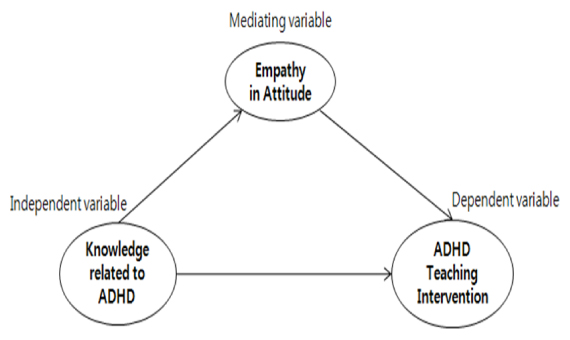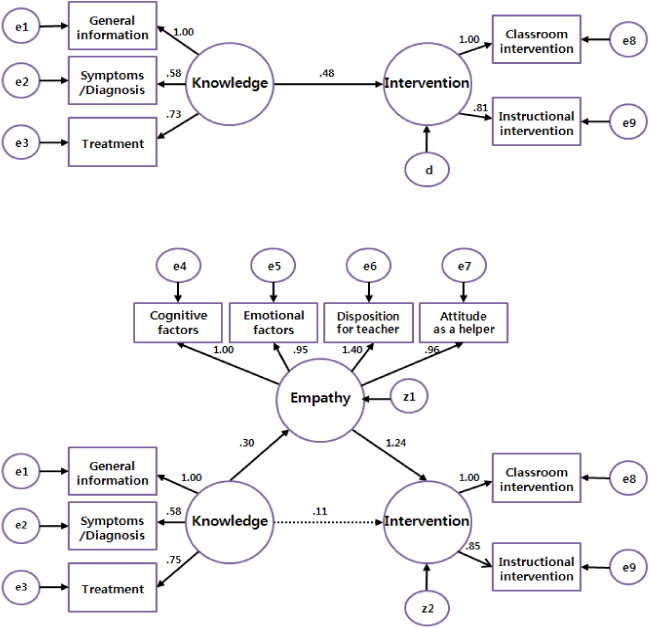J Korean Acad Psychiatr Ment Health Nurs.
2013 Mar;22(1):45-55.
Effects of Teachers' Knowledge and Empathy on Educational Intervention for ADHD: Focused on the Mediating Effect of Empathy
- Affiliations
-
- 1College of Nursing, Kyungpook National University, Daegu, Korea. wanjupark@knu.ac.kr
- 2College of Social Sciences, Kyungpook National University, Daegu, Korea.
Abstract
- PURPOSE
The purpose of this study was to identify how empathy mediates the relationship between teachers' knowledge of Attention Deficit Hyperactivity Disorder (ADHD) and educational interventions.
METHODS
A survey for structural equation modeling was conducted with 334 teachers from 61 schools in D and Y cities in Korea. Data were collected from April 2012 to July 2012 through self-report questionnaires using standardized instruments. The data were analyzed using SPSS Win 20 and AMOS 20, and Sobel tests were conducted to determine the significance of mediation and Bootstrapping tests to construct confidence intervals.
RESULTS
Teachers' empathy provided complete mediation between teachers' knowledge and educational interventions in classrooms. Results showed that empathy contributes positively to educational interventions in ADHD by increasing understanding of children with ADHD and the situation.
CONCLUSION
Based on the findings of this study, teachers need to enhance their empathy towards students with ADHD to increase the effectiveness of their educational interventions for ADHD. These results suggest the importance of focusing on increasing teachers' empathy in the classroom in order to provider better education interventions for children with ADHD.
MeSH Terms
Figure
Reference
-
1. Bae BR. Structural equation modeling with AMOS 19: Principles and practice. 2011. Seoul: Choungram Books.2. Barkley RA. Attention-deficit hyperactivity disorder. A handbook for diagnosis and treatment. 2005. 3rd ed. New York: Guilford Public.3. Baron RM, Kenny DA. The moderator-mediator variable distinction in social psychological research: Conceptual, strategic and statistical considerations. J Pers Soc Psychol. 1986. 51:1173–1182.
Article4. Biederman J, Kwon A, Aleardi M, Chouinard VA, Marino T, Cole H, et al. Absence of gender effects on attention deficit hyperactivity disorder: Findings in nonreferred subjects. Am J Psychiatry. 2005. 162:1083–1089.
Article5. Coreil J. Gochman DS, editor. Health behavior in developing country. Handbook of health behavior research III. 1997. New York: Plenum Press;182–183.6. Dowdy C, Patton J, Smith T, Polloway E. Attention-deficit/hyperactivity disorder in the classroom: A practical guide for teachers. 1997. Austin, TX: Pro-Ed.7. Gu SS. The influence of the special education teacher's empathy ability on their conflict management style and teacher efficacy. J Spec Child Educ. 2012. 14:501–522.
Article8. Hogan R. Development of an empathy scale. J Consult Clin Psychol. 1969. 33:307–316.
Article9. Hwang SY. Kindergarten teachers' knowledge for ADHD and treatment acceptability. J Spec Child Educ. 2007. 9:165–179.
Article10. Hwang SY. Difficulties to early identification for preschooler with ADHD: Focused on knowledge and attitude of ADHD among preschool teachers. J Spec Child Educ. 2008. 10(3):1–17.
Article11. Jung JS, Choi JO. An examination of elementary teachers' knowledge of ADHD, attitudes toward including children with ADHD, and use of behavior management strategies. J Spec Educ:Theory Pract. 2010. 11:371–393.12. Kang KR, Kim YH, Yang YO. Teaching status and knowledge of elementary school teachers to children with ADHD. J Korean Acad Child Health Nurs. 2011. 17:136–144.
Article13. Kenny DA, Milan S. Hoyle R, Kaplan D, Marcoulides G, West S, editors. Identification: A non-technical discussion of a technical issue. Handbook of Structural Equation Modeling. 2012. New York: Guilford;145–163.14. Kim HJ. Problem recognition, coping styles and educational intervention activity of teachers for the children with attention deficit, hyperactivity disorder. 2002. Hwaseong: Suwon University;Unpublished master's thesis.15. Korean Neuropsychiatric Association. Neuropsychiatric. 1998. 2nd ed. Seoul: Hana Medical Pub.16. Lee JO, Seo JM, Kim JS, Jeon SS. A study on middle school teacher's knowledge, coping strategies, and educational intervention for attention deficit hyperactivity disorder. J Korean Soc Sch Health. 2004. 17(2):35–46.17. Lee MW, Park JC. A study on the knowledge classification method for knowledge sharing and usage. J Korean Oper Res Manag Sci Soc. 2002. 10:323–326.18. Lee NY. The effect of school health teacher's empathy degree on children/professional counseling teacher's license and teacher efficacy/job satisfaction. 2007. Cheonwon: Korea National University of Education;Unpublished master's thesis.19. Lee SD, Kim KH. The recent issues and trends of inclusive education. J Incl Educ. 2006. 1:63–81.20. Park HS. Educational approach of attention-deficit hyperactivity disorder. Ewha Educ Res. 1999. 29:113–138.21. Rogers CR. Koch S, editor. A theory of therapy, personality and interpersonal relationships as developed in the client centered framework. Psychology: A study of a science: Volume 3. Formulations of the person and the social context. 1959. New York: Mcgraw-Hill;184–256.22. Sciutto MJ, Terjesen MD, Frank ASB. Teachers' knowledge and misperception of attention-deficit/hyperactivity disorder. Psychol Sch. 2000. 37:115–122.
Article23. Sobel ME. Leinhardt S, editor. Asymptotic confidence intervals for indirect effects in structural equation models. Sociological Methodology 1982. 1982. Washington DC: American Sociological Association;290–312.
Article24. Sung KW, Jo KH. The effects of holistic education on end-of-life care. J Korean Acad Community Health Nurs. 2008. 19:684–695.25. Underwood B, Moore B. Perspective-taking and altruism. Psychol Bull. 1982. 91:143–173.
Article26. Woo JP. The concepts and understanding of the structural equation model. 2012. Seoul: HanNarae Academy Public.27. Yoon HY. Comparative study of potential empathy ability and response level of empathy between school counselors and teachers. 1997. Daejeon: Chungnam National University;Unpublished doctoral dissertation.
- Full Text Links
- Actions
-
Cited
- CITED
-
- Close
- Share
- Similar articles
-
- Mediating and Moderating Effects of Multicultural Efficacy in the Relationship between Cultural Empathy and Cultural Competence in Child Care Teachers
- Mediating Effect of Cultural Competence between Cultural Empathy and Nursing Professionalism in Nursing Students
- The Relationship among Teachers' Empathy, Communication Style and Coping Type for Students with Attention Deficit Hyperactivity Disorder
- The Effects of Empathy on Interpersonal Relationship through the Mediating Effect of Ego-resilience in Nursing Students
- Mediating Effect of Voice Behavior on Relationships between Empathy, Fairness and Intention in Helping Behavior of Nursing Students in Assumed Bullying Situations



